
★ All tutors are responsible for this course
▮ JHS Entrance Exam Essay Course
▮ JHS Entrance Exam Interview Course
○ Senzoku Gakuen Junior High School Returnee Students
〇 Shibuya Kyoiku Gakuen Makuhari Junior High School Returnee Students


★ All tutors are responsible for this course
▮ JHS Entrance Exam Essay Course
▮ JHS Entrance Exam Interview Course
○ Senzoku Gakuen Junior High School Returnee Students
〇 Shibuya Kyoiku Gakuen Makuhari Junior High School Returnee Students

★ 全ての講師が担当します。
★ 志望校の英語試験対策をご希望の場合は、ぜひご連絡ください。過去問など参考になる資料をご提供いただけましたら、それを基に問題を作成し、カスタマイズした対策コースをご提案させていただきます。
レッスンコース
▮ 中学受験 英作文(エッセイ)対策コース(JHS Entrance Exam Essay Course)
▮ 中学受験 英語面接試験対策コース(JHS Entrance Exam Interview Course)

※ 受講者のレベルやご希望で進行速度が異なります。
担当インストラクター
Bella, franz, Haydee, Iris, Ria
English for Cabin Crew は、日常業務で英語を使用する必要のある客室乗務員や、客室乗務員を目指す人々のために特別に開発された教材です。この本では、困難な状況に直面しても、明確で直接的、かつ権威的に、しかし礼儀正しくコミュニケーションを取る方法を学ぶことができます。
English for Cabin Crew は8つのユニットから構成されており、フライトの流れに沿った構成となっています。最初に導入ユニットがあり、その後に搭乗前の準備、搭乗客の歓迎、客室サービスとアメニティ、旅路での健康と医療問題、安全と緊急時対応、降下、着陸、乗り継ぎについてのユニットが続きます。最終ユニットでは、客室乗務員の職に応募する際のアドバイスが提供されています。この本のユニットは独立しており、コース参加者のニーズや興味に応じて選択することができます。また、独学にも適しています。
主な受講対象者:客室乗務員や、客室乗務員を目指す方(中級~上級レベル)

市販教材:Express Series English for Careers Cabin Crew
レッスン中は共有画面でテキストをご覧いただくことはできますが、予習復習で
必要の際は ネット通販などでお買い求めください
Contents
= 8ユニット 50レッスン/25分 =
サンプル教材
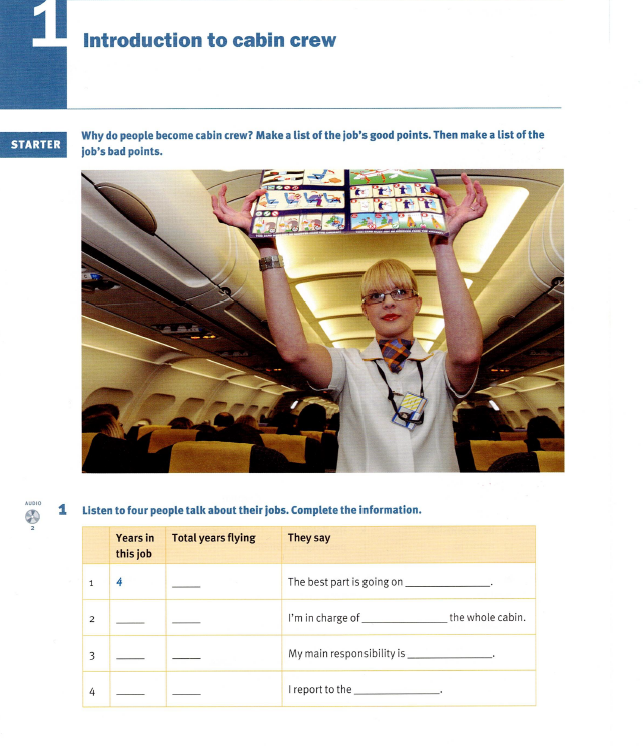
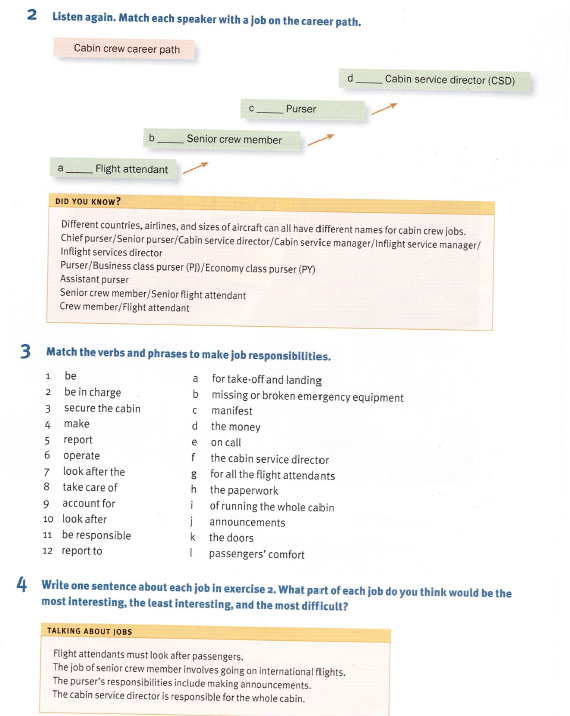
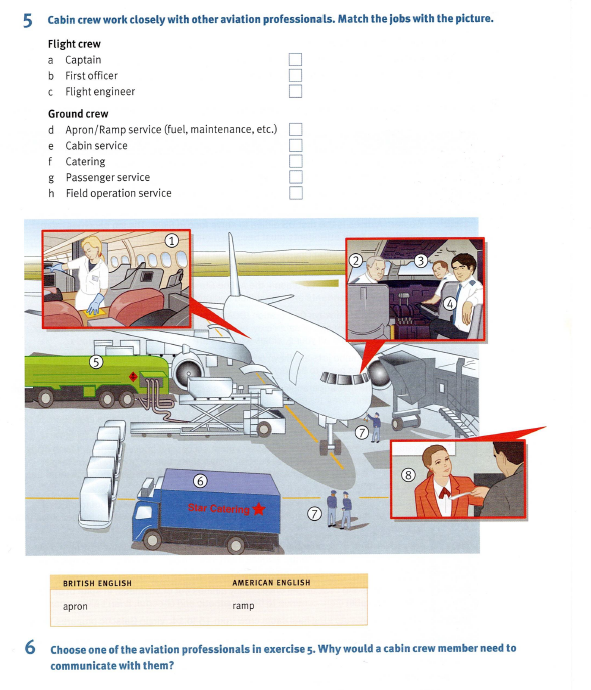
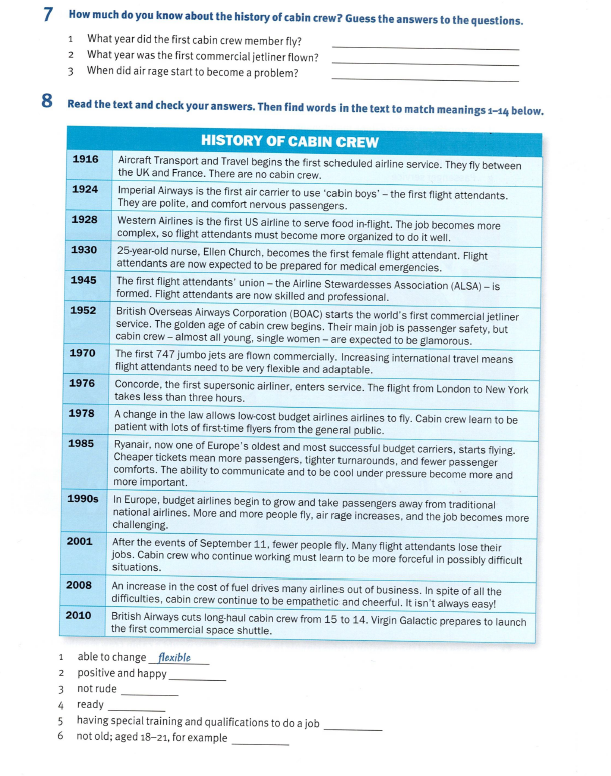
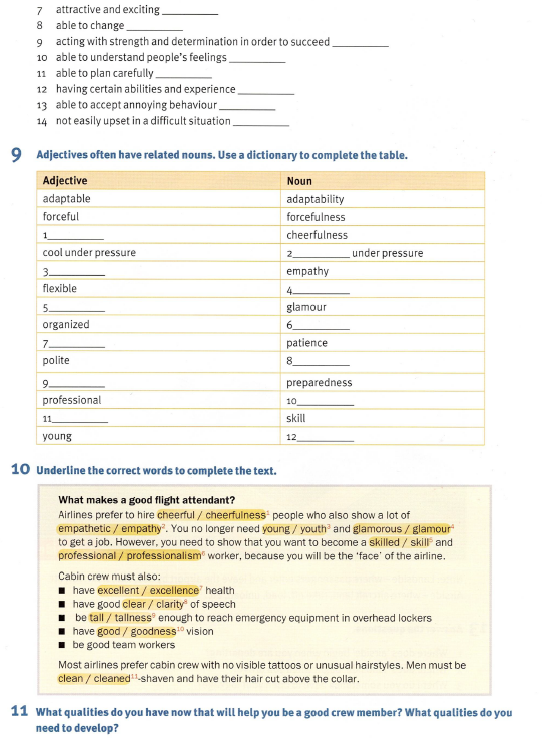
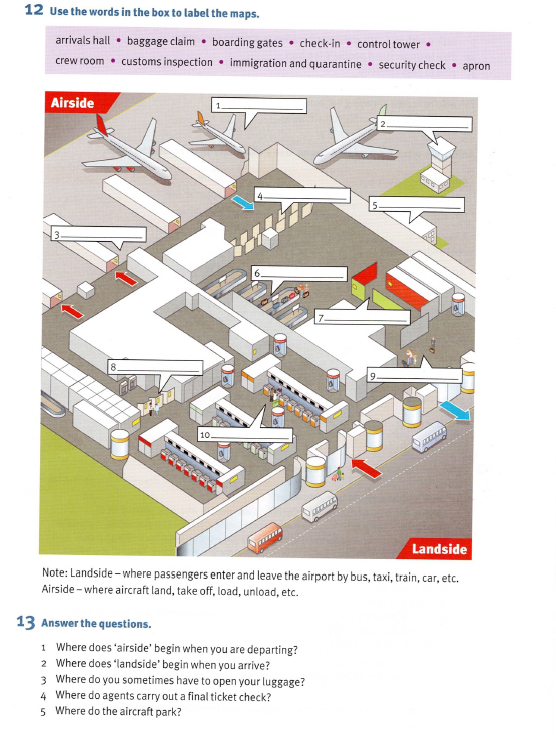
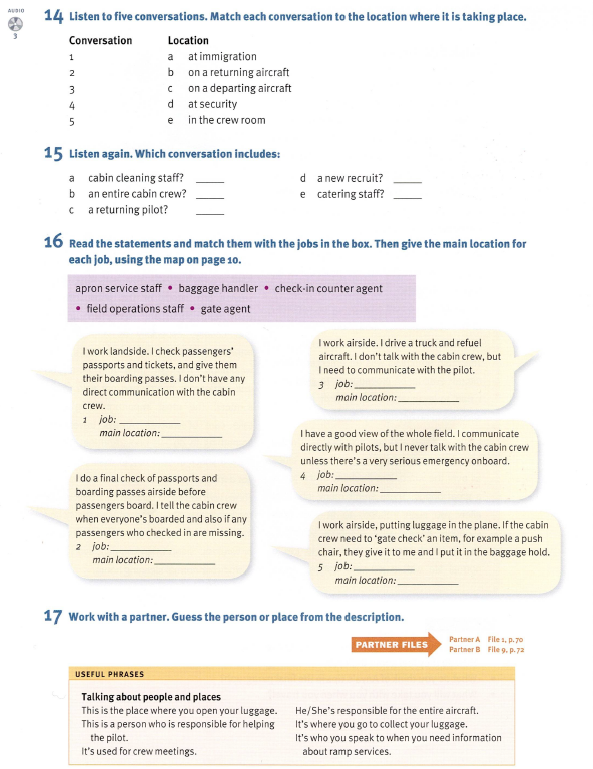
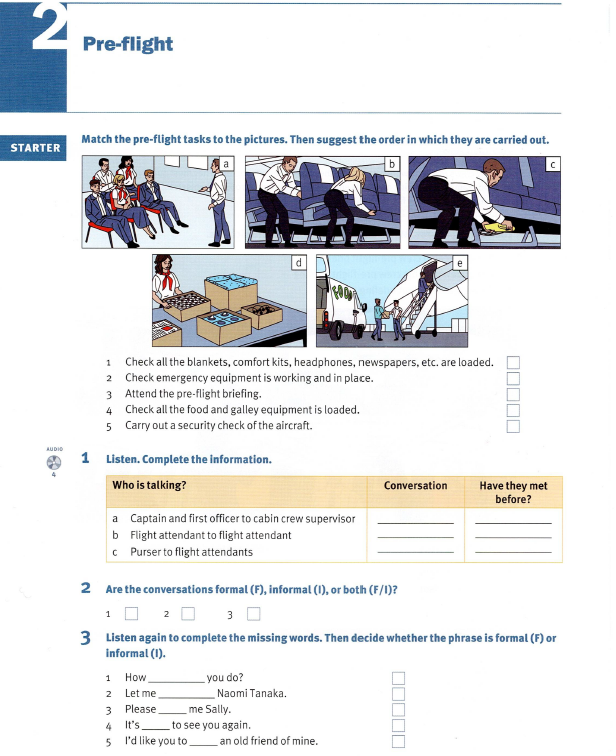
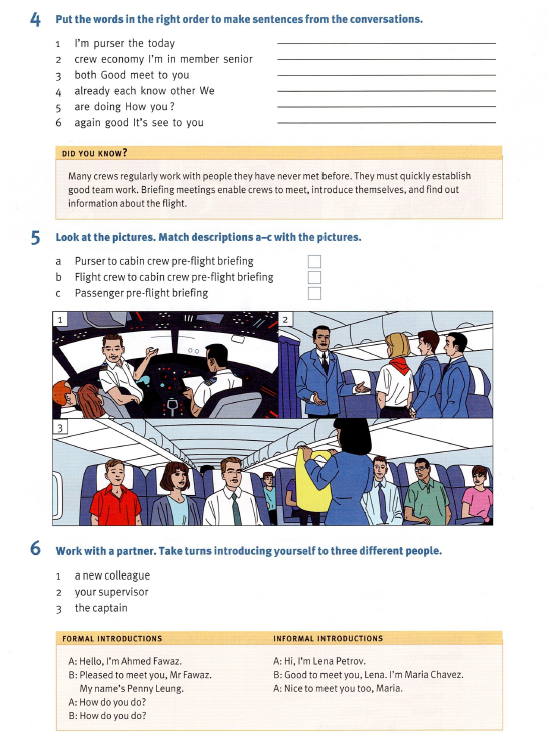
「FOOD」

IELTS スピーキングの採点基準「 Lexical Resource (Vocabulary) 語彙の豊富さ」で
高い評価を得るために、Topic Word (テーマ別単語) の習得が必須です。
試験官は、質問のトピック(テーマ)にどれほど、受験者がTopic Word を
使って回答しているかをチェックしています。
例えば、環境問題について話をするとき、climate change, pollution levels などの単語が
すらすら出てくることを期待しています。
Topic Word テーマ別単語 「FOOD」
以下、5つの単語は「FOOD」に関連したTOPIC WORDです。
単語の定義を覚えましょう

試験で使える!Topic Word 「FOOD」
CUISINE 料理(法)

┃ 定義

┃ 例文
┃ Collocation 連語

APPETITE 食欲、欲望、欲求、

┃定義

┃ 例文
┃ Collocation 連語

BALANCE 釣り合い、平均、調和

┃定義

┃ 例文

┃ Collocation 連語

その他「FOOD」に関連したTOPIC WORD 8 Words
日本語の意味: 塩味やスパイスが利いた、甘くない料理。
例文: “I prefer savory snacks like cheese and crackers over sweet treats.”
和訳: 私は甘いお菓子よりも、チーズやクラッカーのような塩味のスナックを好む。
日本語の意味: 化学肥料や農薬を使わずに栽培された食品。
例文: “Many people are willing to pay more for organic fruits and vegetables for health reasons.”
和訳: 健康上の理由から、多くの人々はオーガニックの果物や野菜にもっと支払う意思がある。
日本語の意味: 健康に良い、栄養が豊富な食品。
例文: “Eating a nutritious breakfast is a great way to start your day.”
和訳: 栄養価の高い朝食をとることは、一日を始める素晴らしい方法だ。
4. Appetizer (前菜):
日本語の意味: 本格的な食事の前に提供される軽い料理。
例文: “The dinner started with a delightful shrimp appetizer.”
和訳: その夕食は、美味しいエビの前菜で始まった。
5. Vegetarian (ベジタリアン):
日本語の意味: 肉を含まない食事をする人、またはそのような食事スタイル。
例文: “As a vegetarian, she prefers meals that are rich in vegetables and grains.”
和訳: ベジタリアンとして、彼女は野菜や穀物が豊富な食事を好む。
6. Spicy (スパイシー):
日本語の意味: 辛い、スパイスの効いた料理。
例文: “He loves spicy food, especially dishes with a lot of chili peppers.”
和訳: 彼はスパイシーな食べ物、特に唐辛子がたくさん入った料理が大好きだ。
7. Gourmet (グルメ):
日本語の意味: 高級な料理や食材に精通している人、またはそのような料理や食材。
例文: “The gourmet chef prepared a unique dish that amazed all the guests.”
和訳: グルメシェフが用意したユニークな料理は、全てのゲストを驚かせた。
8. Cuisine (キュイジーヌ):
日本語の意味: 特定の地域や国の料理スタイル。
例文: “Italian cuisine is known for its emphasis on fresh ingredients and simple yet delicious flavors.”
和訳: イタリア料理は新鮮な食材とシンプルでありながらも美味しい風味が特徴である。
「Topic Word」をインストラクターと一緒にレッスン!
月額制プランを月の半ば(6日以降)から開始される場合、開始月と退会(休会)時にポイントを日割りで配分しております。このポイントの分配理由について説明させていただきます。
オンライン英会話では、月額制プランが毎月自動で更新されますが、通常、更新日に支払いが確認されるまで、その日以降の予約はできない設定になっています。(これは多くのオンライン英会話サービスで採用されている方式です。)つまり、ポイントは更新日のサイクルに基づいて管理(設定)されます。
この方式のデメリットとしては、例えば1月15日が更新日である場合、1月16日以降の予約が1月15日の支払いを受けるまでできなくなることが挙げられます。
弊社では、月ごとにポイントを管理(設定)することで、更新日に関わらず、いつでも1週間から2週間先まで予約が可能になります。この方法により、お好きな講師を計画的に予約できるようになり、受講者の利便性を優先しています。このため、月ごとのポイント設定を採用しています。
アメリカ人が毎日使うスラング・イディオムを学ぶ!
海外ドラマ、日常生活で使われるリアルな英語が楽しく自然に身につく!

ネイティブのリアル英語 fender bender(軽い自動車事故)
「軽く事故った」って英語ではどう言うんでしょうか?
I had a fender bender.
という表現があります。
fender「フェンダー」とは「車輪についている泥よけの覆い」のこと
benderは、「曲げる」を意味するbendにerがついたもので、「曲げるもの」の意味なので、
fender benderは「フェンダーが曲がってへこむ程度の軽度の事故」の意味です。
他に事故を表す単語には、
“head-on car crash”「正面衝突事故」、
“hit-and-run accident”「ひき逃げ事故」、
“pile-up”「玉突き事故」
などがあるので一緒に覚えておきましょう。
例文 1

On the way home from work I was in a minor fender bender,
luckily nobody was hurt, just the cars.
仕事から帰宅する途中、ちょっと事故ってしまった。運よく誰もけがすることなく、車だけだった。
例文 2

I was in a fender-bender this morning. I was totally fine but I was driving my dad’s car.
今朝軽い事故起こしちゃったんだけど、私は大丈夫よ。パパの車だけどね。
「 fender bender 軽い自動車事故 」習得・攻略

I got into a car accident this morning, but don’t worry. It was just a fender-bender.
I got into a car accident this morning, but don’t worry. It was just a minor accident.
I god into a car accident this morning, b’t don’t worry. It w’z just a fender-bender.
同義語
a small car accident
Bender を使ったイディオム
● Bender of the Elbow :「肘を曲げる者」(酒をよく飲む人を指す)
例文:He’s a real bender of the elbow; he’s always at the bar.
彼は本当の肘を曲げる者で、いつもバーにいます。
● Go on a Bender: 「飲み過ぎる」(アルコールを大量に摂取する)
例文:He decided to go on a bender after a stressful week at work.
ストレスの多い週の後、彼は飲み過ぎることに決めました。
● Bender of the Truth :「事実を歪曲する人」(真実を曲げたり変えたりする人)
例文:You can’t trust him; he’s a bender of the truth.
彼を信用してはいけません。彼は事実を歪曲する人です。
● Bender in the Wind :「風に揺れる人」(意志が弱く、状況によって変わる人)
例文:He’s like a bender in the wind, always changing his opinions to fit in.
彼は風に揺れる人で、常に自分を合わせるために意見を変えます。
● Bender’s Delight :「飲み過ぎて楽しい時間を過ごすこと」
例文:We had a bender’s delight at the party last night; it was wild.
昨夜のパーティでは飲み過ぎて楽しい時間を過ごしました。とても楽しかったです。
● Bendered Out :「飲み過ぎて疲れ果てた」
例文:After a week of partying, he was completely bendered out and needed a break.
1週間のパーティの後、彼は完全に飲み過ぎて疲れ果てて、休息が必要でした。
全てのレッスンコースは「ポイント制プラン」または「月額制プラン」でご利用いただけます。
TOEFL iBTの4科目(80➤90)受講プランについては、以下のウェブサイトで
詳細をご案内しておりますので、ポイント制プランをお申し込みください。
受講プランと料金 — TOEFL iBT 4科目 80➤90
Multi Account (複数科目同時受講アカウント)ご利用方法
料金についてはHページ上部メニュー 「料金案内」をご確認いただけますと幸いです。
< 複数アカウント保有のご注意点 >
(1)レッスン予約に必要なポイントの購入・管理はアカウント毎にお願いします。
(2)後日、ポイントを別のアカウントに移行したり、1つのアカウントに統合する場合は、
ポイント有効期限の短いアカウントの有効期限に統一されますのでご了承ください。
例: アカウントA (有効期限2022年10月30日)、アカウントB(有効期限2022年9月30日)
アカウントAからアカウントBにポイントを移行した場合、移行したポイントの有効期限
は2022年9月30日となります。
(3) 一度、1つのアカウントに統合されたポイントを後日、2つのアカウントに分ける
ことはできません。
(4)複数アカウント間でポイントの移行をご希望の際は、その都度有料(980円)となります
のでご了承ください。
上記のように、各アカウント毎にポイントを管理する複数アカウント保有とは別に、二つのアカウント間でポイントをシェアする方法もご用意しております。
<サンプル> 学習プラン IELTS 2科目
受講コース: IELTS Speaking, Writing, (2科目)
現在スコア: Speaking 5.0 / Wriing 6.0
目標スコア: Speaking 5.0 / Wriing 6.0
学習期間: 2023年 11月 1日 ~ 2024年 4月 30日 180日
標準学習時間 : 200 + α 時間
1日平均学習時間 : 約 66分 + α
目標スコア達成には標準学習時間 200時間以上必要です。
各試験の目標スコアを達成するために必要な時間については、以下のURLのサイトからご確認ください。
標準学習時間 200時間+α を「オンラインレッスン」、「オンラインレッスン予習復習」、「その他学習」に分けて学習プランをご案内させていただきます。
IELTS 対策 中級レベル コースの選び方及びレッスン内容
|オンラインレッスン 2科目 内訳
● スピーキング 100 レッスン (41.5時間)
IELTS Speaking Crash Course 30 レッスン
IELTS Speaking Useful Phrase Course 20レッスン
IELTS Speaking Mock Test 50 レッスン
● ライティング 100 レッスン (41.5 時間)
IELTS Writing Academic (特訓ゼミ) 60 レッスン(30問)
IELTS Writing Crash Course 40 レッスン
オンラインレッスン合計:200 レッスン 約 83 時間 ※ 費用 69,600 円
(費用内訳 : ポイント制プラン 100ポイント(34,800円) × 2 )
| 予習・復習+その他学習 117 時間 + α
| 学習時間合計 200 時間 + α
注意事項:
① IELTS Speaking, Writing, 2科目を同時進行で受講いただくために、
アカウントを2つ(1アカウント追加)お作りいただくことをお勧めします。
複数のレッスンコースを受講いただく場合はこちらからご確認ください。
複数コースを同時に受講する方法(1つのアカウントまたは、複数アカウンを使う)
2科目(例:Speaking, Writing)を同時に受講する方法
ポイントシェアをご利用される場合はポイント制プランをご利用ください。
② 学習時間や内容は、個人の進捗や必要に応じて調整してください。
③ 定期的に試験を受け、必要に応じて計画を見直してください。
以上が学習プランのご提案となります。 お役に立てば幸いです。
「CITY」

IELTS スピーキングの採点基準「 Lexical Resource (Vocabulary) 語彙の豊富さ」で
高い評価を得るために、Topic Word (テーマ別単語) の習得が必須です。
試験官は、質問のトピック(テーマ)にどれほど、受験者がTopic Word を
使って回答しているかをチェックしています。
例えば、環境問題について話をするとき、climate change, pollution levels などの単語が
すらすら出てくることを期待しています。
Topic Word テーマ別単語 「CITY」
以下、5つの単語は「CITY」に関連したTOPIC WORDです。
単語の定義を覚えましょう
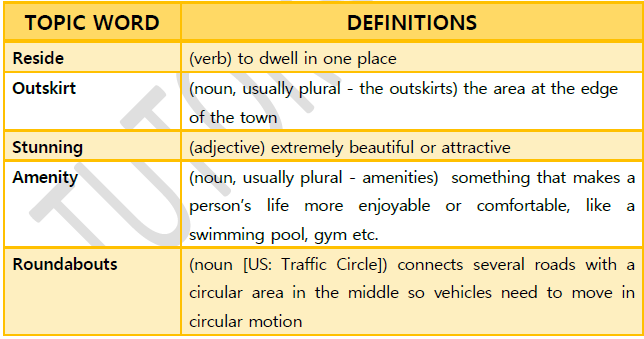
試験で使える!Topic Word 「CITY」
COSMOPOLITAN 世界各地の人々からなる、全世界的な、国際的な

┃ 定義

┃ 例文

┃ Collocation 連語

RESIDENTIAL 住宅の、住宅向きの

┃定義

┃ 例文

┃ Collocation 連語

FACILITY 設備、施設

┃定義

┃ 例文

┃ Collocation 連語

その他「CITY」に関連したTOPIC WORD 10 Words
Meaning: A large and important city.
Example: “Tokyo is a bustling metropolis known for its towering skyscrapers.” (東京は、高層ビルが立ち並ぶ活気あふれる大都市です。)
Meaning: The basic physical and organizational structures needed for the operation of a city.
Example: “The city’s infrastructure includes roads, bridges, and public transportation systems.” (その都市のインフラには、道路、橋、公共交通機関が含まれます。)
Meaning: The process by which towns and cities are formed and become larger.
Example: “Urbanization has led to the growth of cities and changes in lifestyle.” (都市化により、都市が成長し、ライフスタイルが変化しました。)
Meaning: The outline or silhouette of buildings and structures in a city.
Example: “The city’s skyline is dominated by a famous skyscraper.” (その都市のスカイラインは、有名な超高層ビルによって印象づけられています。)
Meaning: An area on the edge of a large town or city.
Example: “Many families choose to live in the suburbs for a quieter lifestyle.” (多くの家族は、より静かな生活のために郊外に住むことを選びます。)
Meaning: A city or town with its own local government.
Example: “The municipality is responsible for providing local services and maintenance.” (市町村は地域サービスと維持管理の責任があります。)
Meaning: The main business district of a city.
Example: “Downtown is always busy, with people bustling to and from work.” (都心はいつも忙しく、仕事に向かったり帰ったりする人々で賑わっています。)
Meaning: The number of people living per unit of area.
Example: “The population density in this part of the city is very high.” (この都市のこの部分の人口密度は非常に高いです。)
Meaning: A prominent or well-known object in a city.
Example: “The statue in the city square is a historic landmark.” (市庁舎の像は歴史的なランドマークです。)
Meaning: Systems of buses, trains, etc., provided for people to travel around a city.
Example: “Public transport is essential for daily commuting in a large city.” (公共交通機関は、大都市での日常の通勤に不可欠です。)
「Topic Word」をインストラクターと一緒にレッスン!